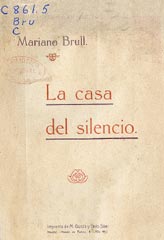4.1.1.7.1 The first poetry books by Mariano Brull (1891 – 1956)

Mariano Brull’s poetic work began with his 1916 collection of poems, “The House of Silence,” in which a modernist aesthetic predominates in the formal treatment of topics; and in terms of emotional depth, it reveals a depth devoid of exaltation, a quality that would remain throughout his work. Some avant-garde contributions associated with the purist conception of lyric poetry are already emerging.
Although he published the purist title “Quelques poemas” in Brussels in French in 1925, his baptism of full immersion in this aesthetic movement took place with “Poemas en menguante” (Wanking Poems) in 1928, which reflects the breaking away from all ties to circumstances in order to reach the ideal uncontaminated by the figurative.
The verses of this collection of poems reveal a creative freedom that, while associated with the avant-garde, lack the formal fervor of the latter or the ironic tone that characterized many of the pieces anchored in this aesthetic movement, which the author surpassed without touching it in his work. He now embarks on a break with the logic of language and its affective connotations, reaching the purely sonic level of poetry with a high aesthetic status.
The verses of “Verdehalago” illustrate the transmutation of language carried out by Mariano Brull, also in terms of social convention, with childlike resonances given his intention precisely to reach a use of the word not yet in the realm of meaning, as a verbal savoring and where the repeated allusion to the color green indicates what is visually pure, all of which influences the poem to constitute a great synesthesia in which sound and color are mixed:
“For the green, green
sea green greenery
Rr with Rr.
Friday, comma, virgin
green dwarf
Verdularia cantharida
Rr with Rr
Greenery and verdigris
vegetables and greens
green, double green
of cabbage and lettuce.
Rr with Rr
in my lemon green
green bird.
For the green, green
wet green flattery
stretching out. –Stretch out.
I come from Mundolido
and I am in green praise.”
In this collection of poems, the so-called fruitive and intellectual aspects of Mariano Brull’s purism are already present, marked by the search for timeless and atopic essences beyond everything surrounding them, as an abstraction of them, in order to arrive at a truth and capture a truly absolute beauty, impossible from its very conception, given the inability to transpose essences that are in any case elusive into words.








